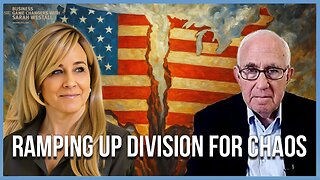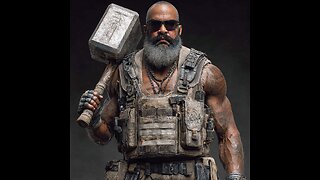Premium Only Content

Jennings: Trump’s Not Denying Slavery, He’s For Shifting Focus from Something Terrible from Our History
PHILLIP: “He‘s said as much by ending this post with: ‘This country cannot be woke, because woke is broke.+ He says, ‘We have to have the hottest country in the world, and we want people to talk about it, including our museums.’ Why is he equating talking about slavery with woke?”
JENNINGS: “Well, look, I think — let me just start this conversation by saying that my personal view is slavery was a reprehensible institution. I agree with your words that it was our original sin. We also fought a war to eradicate it and to get over it as a country. And that was a necessary thing that happened, and a lot of people died, and we did eradicate it. And that‘s a good thing. I think what he‘s asking is, in our museums, what defines us? Are we going to be defined by the worst moment or the worst institution, or the worst mistake we ever made? Or are we going to be defined by what we‘ve done moving forward to get over it and to become the greatest nation on the earth? My belief is that he wants to look at these museums, not because he wants to do away with the idea that slavery occurred, but that he wants to ask a very simple question: Are we going to present ourselves as being exceptional or not? And I think he believes there is an effort by some to continue to try to define us from our worst moment, instead of try to focus and define us based on our best moments, which started when we eradicated slavery and began to move forward as the light of the world. And so that‘s what I think.”
SINGH: “But doesn’t what makes museums — that‘s what makes us an exceptional nation, is because they tell the history and the story of our country, and therefore, you know, these horrible, horrific moments in our history that the original sin, as Abby talked about, when it comes to slavery, has — you know, we, of course, did eradicate it, but look where we’ve come today. And I think those museums, like, to your point, make America exceptional. And in museums all around the world that document atrocities, whether it be, you know, from Nazi Germany to eradicating slavery here in the United States, you have to learn the lessons of the past. And to deny it is to defend it.”
JENNINGS: “I don‘t think he‘s denying it. And Batya, you may want to comment on this as well, but I — I think what he wants to ask is a simple question: As we present our history, are we spending most of our time focused on something terrible, or are we going to spend more time as we enter our 250th anniversary focused on what this country has done to improve the lives of every single person who lives here? We are the light of the world for a reason, because we‘re an improving commodity.”
PHILLIP: “The questions I ask when I hear you say that is, why — I mean the idea that slavery happened, it‘s hard to understand what we‘ve overcome if you don‘t even talk about what it was. You know, I think that that kind of waters down the whole experience.”
JENNINGS: “I don‘t think anybody is proposing that we ignore that it happened. I don‘t think that‘s accurate.”
SELLERS: “I think that the problem is that there are people, and Scott used the term a couple of times, and I don‘t think it was meant with any type of ill intent, but he said, ‘We got over it.’ And I think that’s the problem.”
-
 4:47
4:47
Grabien
1 day agoHillary on What’s Wrong with the Democratic Party: It Probably Boils Down to Candidates and Their Message
91 -
 1:32:21
1:32:21
The Charlie Kirk Show
4 hours agoTHOUGHTCRIME Ep. 98 — The Comey Indictment? Antifa Agenda? Charlie and the Cubs?
88.1K49 -
 1:04:56
1:04:56
Sarah Westall
4 hours agoPolitical Assassinations, Targeted Hit Lists - Manufactured Chaos w/ Harley Schlanger
55.7K12 -
 1:11:31
1:11:31
Flyover Conservatives
11 hours agoThe “J Walker” Secret: One Daily Habit That Shifts an Entire City - Tammy Hotsenpiller | FOC Show
42.7K2 -
 2:12:02
2:12:02
Mally_Mouse
7 hours ago🎮Throwback Thursday! Let's Play: Wii Sports Resort!
38.1K2 -
 LIVE
LIVE
Akademiks
4 hours agoATLANTA IS BACK. Young Thug and YFN best buddies now. ATL backs Thug officially!
1,258 watching -
 5:40:35
5:40:35
Reolock
6 hours agoWoW Classic Hardcore | 3 LEVELS REMAIN
36.8K3 -
 3:00:23
3:00:23
Sgt Wilky Plays
5 hours agoThirst Trap Thursday | Regiment Donor Drive
31.2K -
 4:12:29
4:12:29
Fragniac
6 hours ago🔴 LIVE - FRAGNIAC - THE FINALS - IT'S ABOUT TO BE A MOVIE❗🎬📽 🎞
23.9K2 -
 1:39:44
1:39:44
Glenn Greenwald
7 hours agoJames Comey Indicted; TikTok and CBS Taken Over by IDF Funder Larry Ellison; Republicans Blame Rhetoric for Violence: Is "Stochastic Terrorism" Real? GOP Blocks Release of Epstein Files | SYSTEM UPDATE #521
143K81